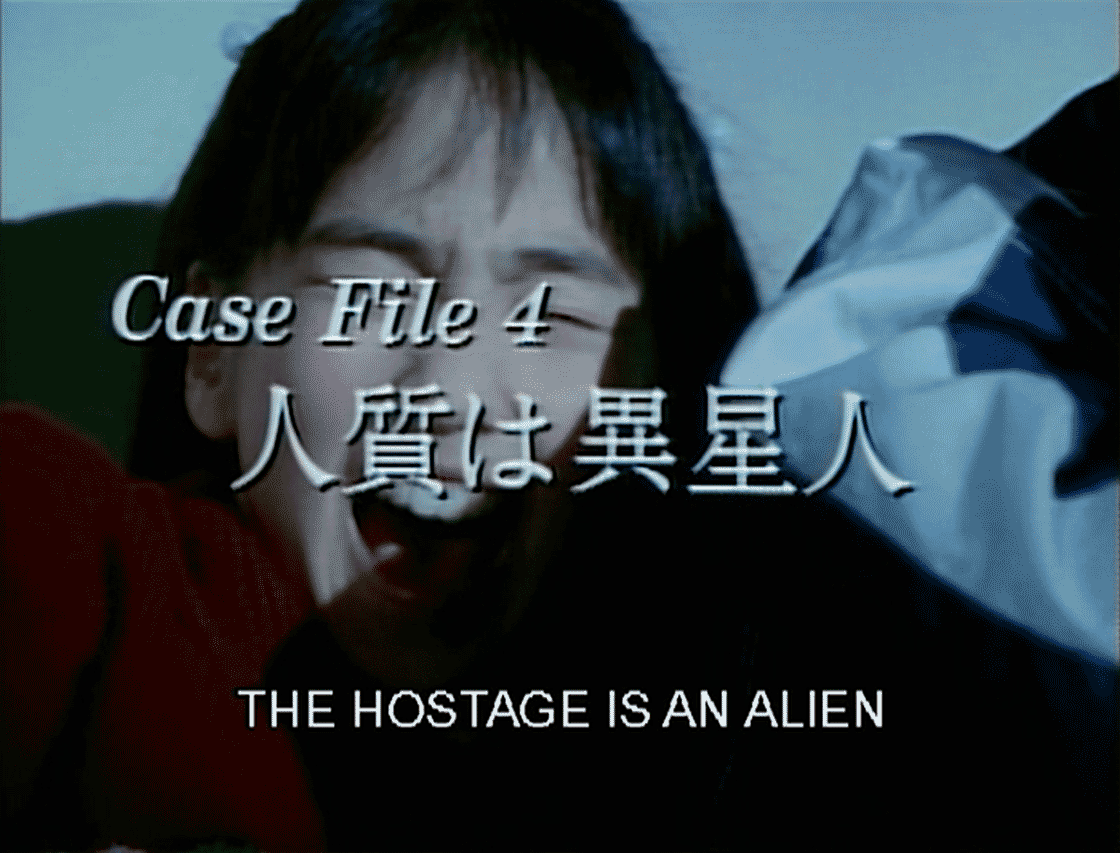
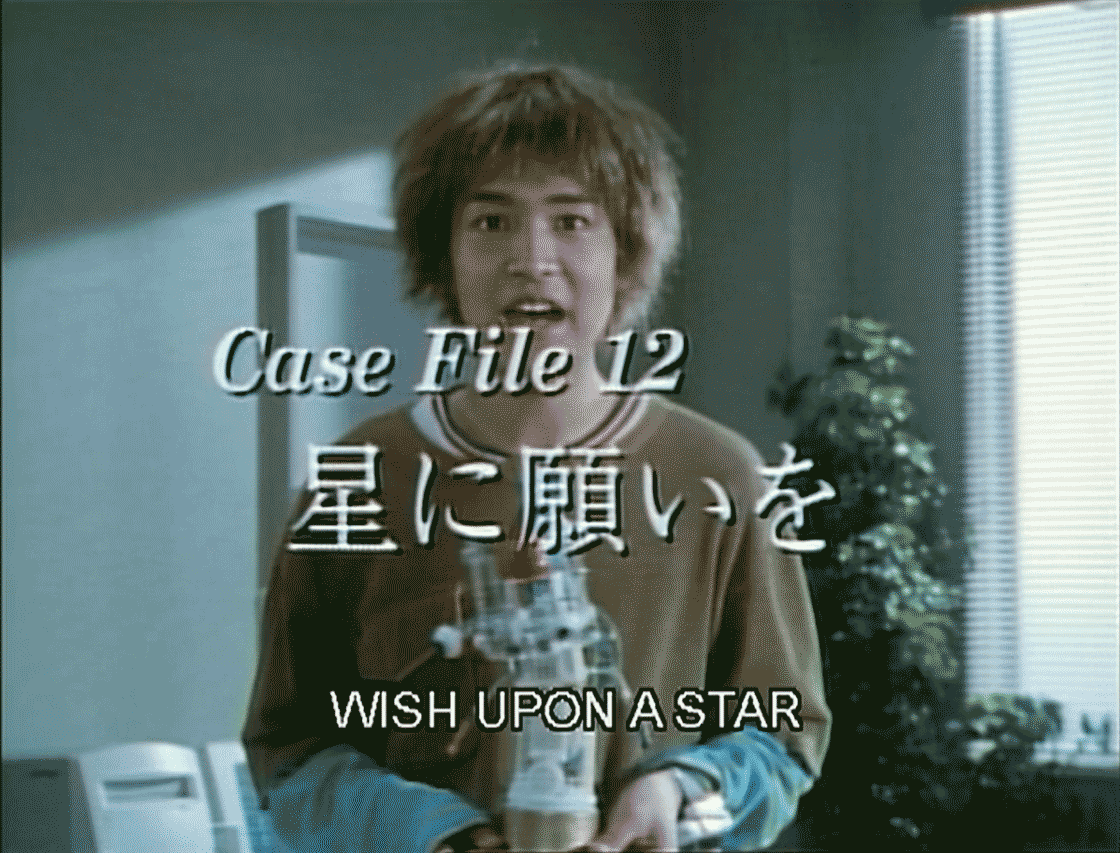
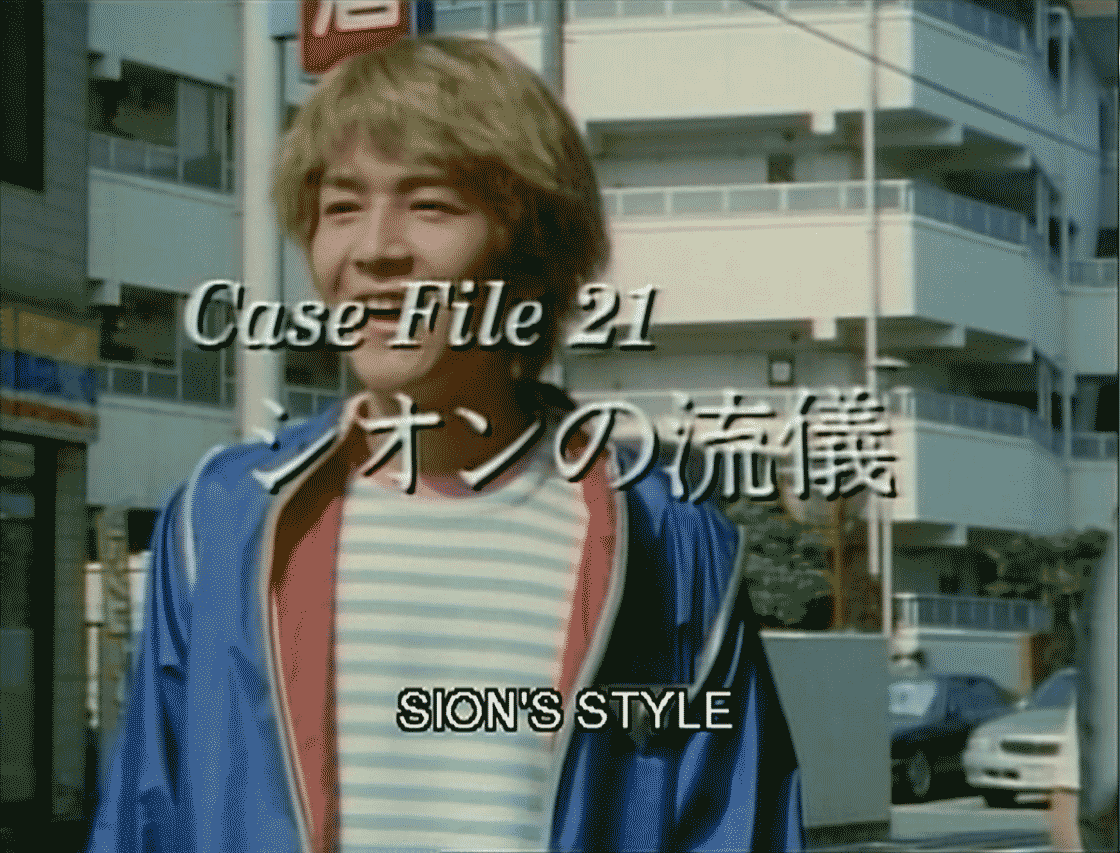
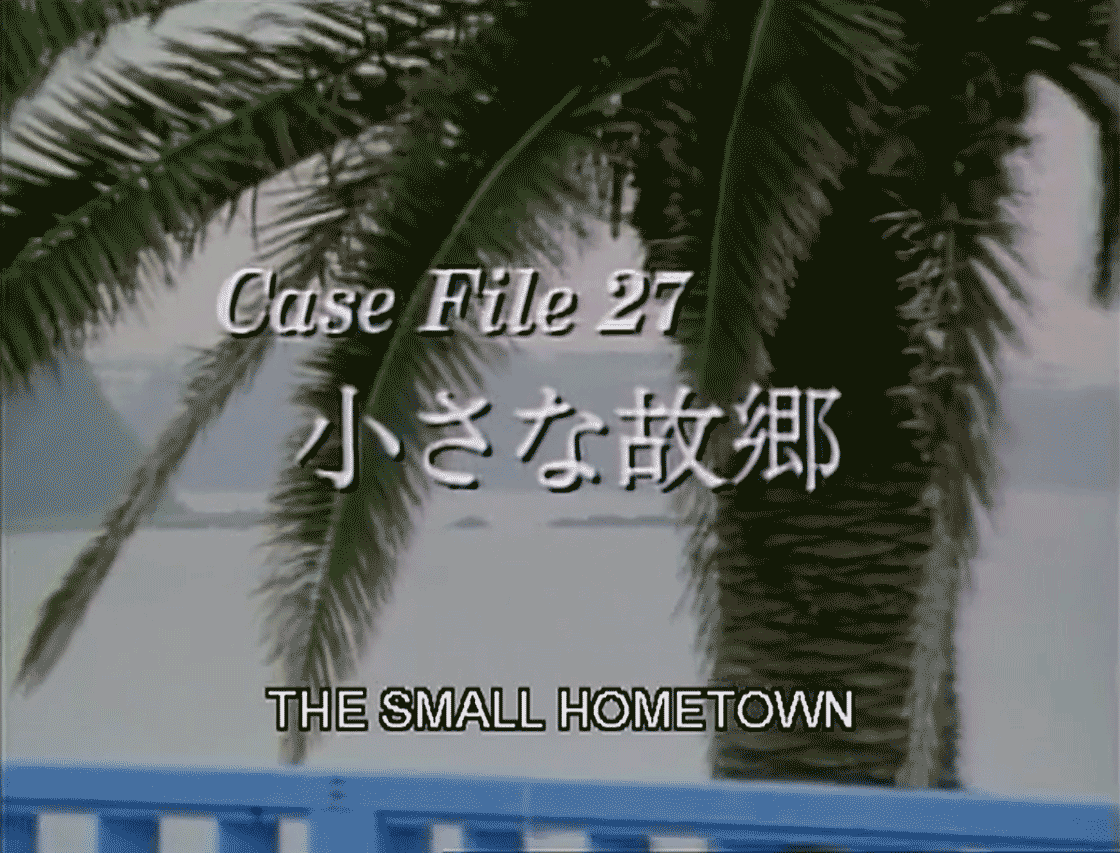
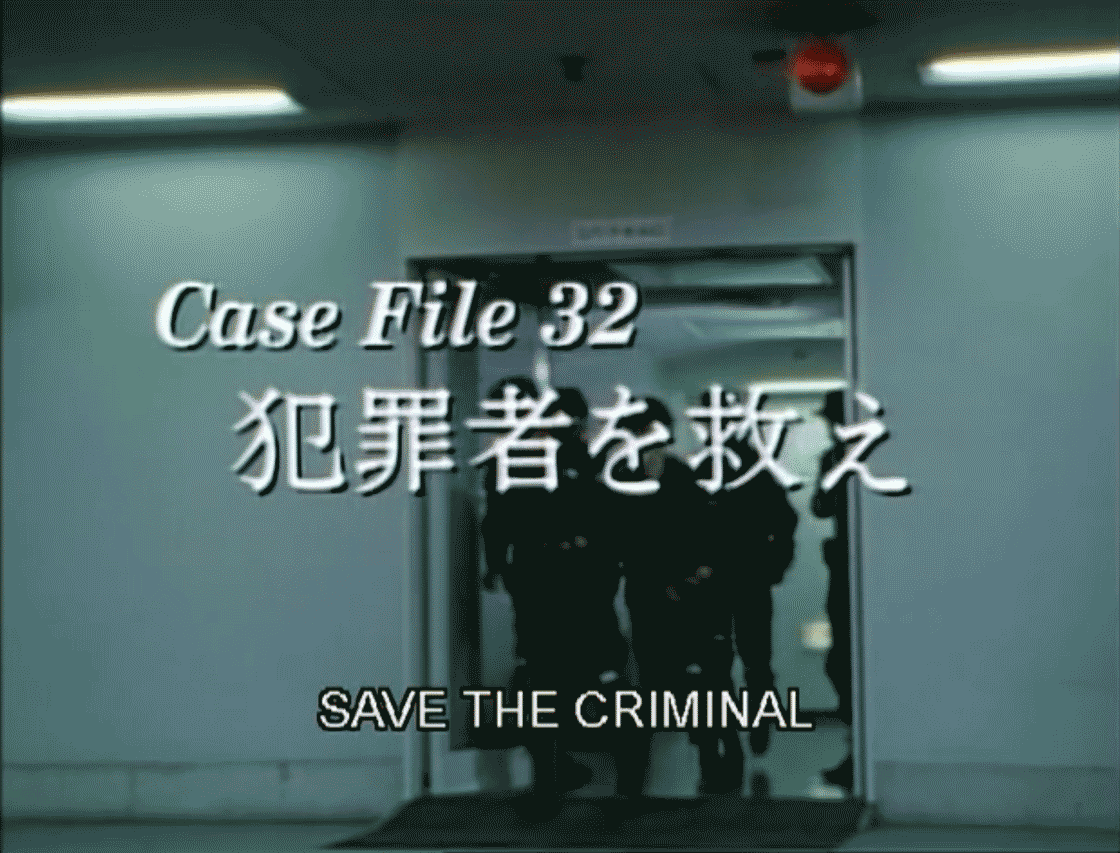
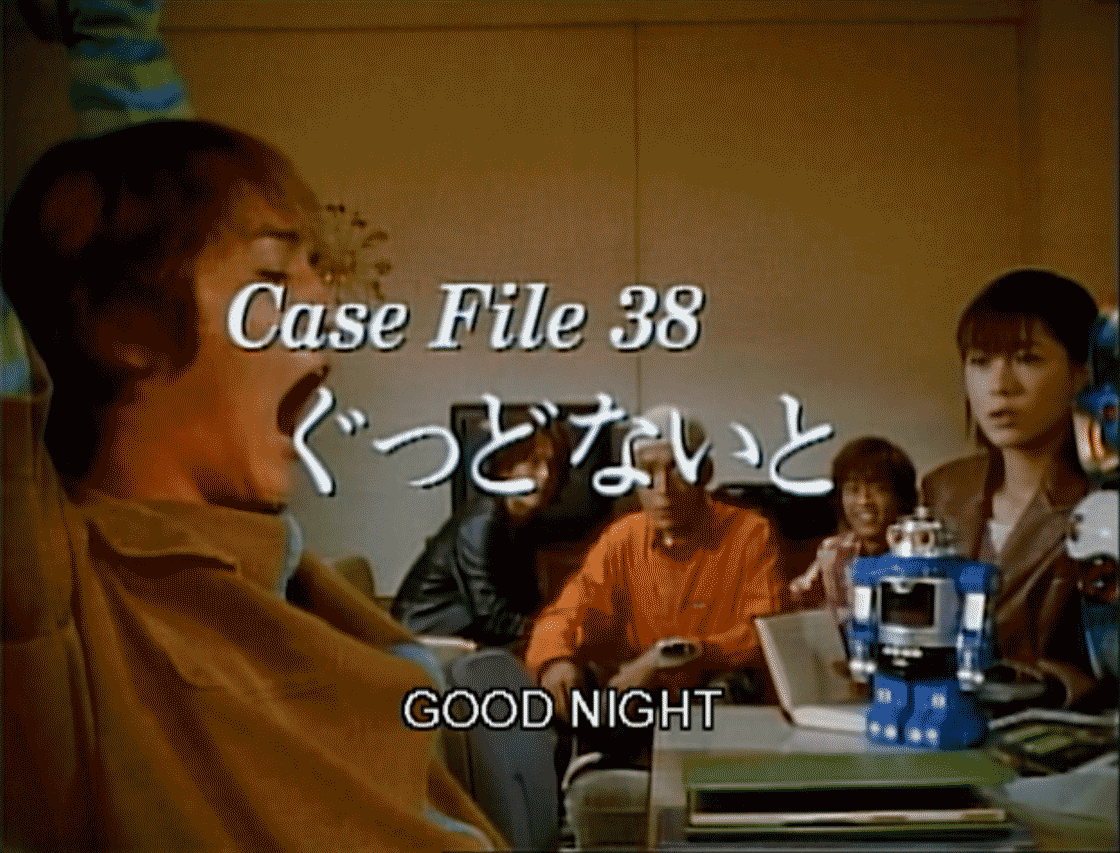






Sion has 6 feature episodes, and most of them show him reinventing himself after overcoming some aspect of his identity that has been distorted by a mistaken perception.
Facing up against the preconceptions of his surrounding environment and turning them around is his defining trait as a hero,
and it's what made me, rewatching this children's show as an adult, interested in his character.
There are lots of episodes that I think even those who would say "Power Rangers? Super Sentai?
I stopped watching that at least 10 years ago!" to watch, so please check out this ranking (even though I may be reading too much into things!).
| 6.Good Night |
|---|
| EP.38 2000/11/12 |
|
We start off with this title screen in which Sion seems to be about to bite into the character "ぐ".
This episode is about the hibernation period that Hubbardians experience just once a year,
so there are a lot of non-sequitur scenes from Sion's dreams.
The episode was broadcast on Nov. 12, as the finale was approaching and the series building up to its climax,
and has a bad reputation as a filler episode unrelated to what's going on before and after, putting a damper on the heightened tension of the main story.
The reason that even I place this maligned episode in last place is that the heroic stance I mentioned at the beginning is almost entirely absent, and we don't get to see Sion's strengths as a character. Maybe it can't be helped, but his dream doesn't feel very dream-like, and because he's so sleepy he hardly talks or in fact does anything, and leaves the main roles to the other characters. In fact, it's too bad for Sion that the kindness of Tatsuya offering him a pillow and Domon buying lots of food for him to gorge on before going to sleep stands out more. Since it's his last feature episode I wanted for him to be better featured, but it seems like he, who more than anyone enjoyed the 20th century, wasn't able to create the drama necessary for the final stretch. The result is an episode best enjoyed as a chance to see the other characters' cosplay. |
| 5.The Hostage is an Alien |
|---|
| EP.4 2000/03/05 |
|
Sion, who experiences freedom for the first time in the 20th century, gets captured by the Londerz due to his lack of social experience.
Though he inconveniences and causes worry for the other Timerangers, the happy ending has the group finding an increased sense of unity.
That being said, it's actually Domon who ends up stealing the spotlight, bringing it down to 5th place, though it does have its good points.
At first glance Sion seems like a cheerful and energetic boy, but in fact he lived with overwhelming loneliness. This episode makes that gap clear, teaching kids that a person can't always be understood by their appearance or demeanor, and that a person should be known as an individual and not according to their status or what group they belong to, which is certainly a strong point. One example of that is learning that Sion has blue hair not because he's an alien, but just because he likes dying his hair. Bringing attention to our unconscious biases and preconceptions helps us value the greater part of ourselves that we in fact share in common, rather than the small differences which tend to stand out. This ultimately makes us more open to others. Noticing the fact that our sense of self is in fact dependent on the common sense that surrounds us is important for accepting all of the differences that exist in the world. Also, Sion showing vulnerability and a lack of confidence while risking his life in order to save the other kidnapped children shows that one doesn't necessarily need to be physically or mentally strong to be a hero. It's better than "Good Night" in 6th place, and Sion playing a more prominent role gets it more points. As an unrelated aside, this is the only feature episode where Sion has blue hair, and eagerly anticipating watching this episode is one of my good distant memories. |
| 4.Wish Upon a Star |
|---|
| EP.12 2000/04/30 |
|
Sion learns that the special powers of an alien named Argo from the Planet Arcturus hiding on earth in the 20th century are being used by the Londerz, and stands up against this injustice.
Since Sion is the sole survivor from the Planet Hubbard in the 20th century,
his rights were violated and he was taken advantage of by Earthlings who placed him under their power, resulting in his sense of self being damaged.
Sion has gained a new sense of his own rights and identity in the 20th century, allowing him to objectively evaluate what it means to be treated improperly,
which leads him to relate to and stand up for Argo, who has similarly been isolated and had his rights stolen.
Compared to how he recklessly endangered his own life a few months ago (in The Hostage is an Alien), Sion can now fight with his own clear sense of right and wrong, a sense of justice which he can now apply to his own past. To put it simply, it made me think that when one is being treated unjustly, it's more important to improve the system that allowed for that treatment in the first place than it is to improve one's own status. In other words, this episode helped me understand that one's current relationships and environment aren't absolute, and neither is one's identity that is dependent on those things, so there's no reason to assume that one can only be the way one is now. The peculiar friendship between Hayato-kun and Argo-san serves as a good backbone for the story, but it's ultimately unclear what it wants to say, which is why I put it in 4th. Argo's high-tone whisper voice also distracted me throughout the episode, which is another reason for this position. |
| 3.The Small Hometown |
|---|
| EP.27 2000/08/20 |
|
Sion, who has no memories of a hometown, meets a man named Tachibana-san, who strives to protect his,
and the two's interactions teach Sion what it means to have a hometown.
Tachibana-san's actions might look like those of a "get off my lawn" old man,
but I think everyone feels a connection with the place where they were born and grew up, and no one would want for it be invaded by people who have no respect for it.
Human history, however, is unfortunately nothing but mutual invasions.
I don't think that Sion actually found his hometown in the 20th century. To me, this is another episode about Sion standing up for someone else's justice, this time Tachibana-san's. Sion, due to a lack of experience, doesn't understand such things as a hometown, friends, or even a sense of self, and can only come to know them through other's experiences. He can't stand alone, and his character is only brought out through his comparison with or relation to others, which is both his weakness as well as one of his strengths as a hero. It may sound like a bad thing, but in other words, his introverted empathy and sensitivity allow him to fight to protect others' values. I think being able to respect someone else's sense of righteousness, even if it's unrelated to oneself, is a great trait. If he was able to do this for a "hometown" that he himself never knew, then I think one can say he came to understand what it means to value one. |
| 2.Save the Criminal |
|---|
| EP.32 2000/10/01 |
|
The prisoner D.D. Ladis requested to be freeze-compressed again in order to repay his crimes, but instead Gien attaches a remote device to him and forces him to attack people.
The City Guardians don't hesitate to open fire on him, and Ladis happens to encounter Sion as he tries to escape.
Sion understands his situation and trusts him, even fighting to protect his good name. Feel free to laugh, but this episode influenced my personal values. And that's as an adult!
At that time I had lost my will to live, so must have been looking for something, which I was glad to find regardless of whether it came from a children's show.
This episode has a rather difficult theme, so is hard to comment on. The situation resembles that in which a hungry bear comes down from a mountain, attacking homes and livestock, and although it may not have any ill-will, there's no choice but to exterminate it. Because Ladis is a Londerz prisoner, he is lumped together with them, with his own character and intentions ignored. Sion treats him as an individual, but the City Guardians take a totalitarian approach, which means he is their enemy. Totalitarianism may be able to secure the good of the majority, but as a result the same equality and common sense is forced on everyone, and isn't actually based on superior human values or judgement. In other words, just because something isn't currently valued in light of the overall good of society, that doesn't mean that it lacks inherent value or will always be considered as inferior. In fact, a sense of justice that values the feelings of individuals may not lead to the good of society or the majority. It should, however, be understood and tolerated by each individual's moral values. Overvaluing society as a whole over individuals shouldn't mean that we have to give up on what is really right. I'm not completely sure what I'm trying to say, but the episode made me think a lot, so it gets 2nd place. By the way, Power Rangers Time Force has an equivalent episode, but the American version of D.D. Ladis, Notacon, is just a childish vegetable robber who hasn't done anything seriously wrong, making it easier to trust and sympathize with him and simplifying the distinction between good and evil. |
| 1.Sion's Style |
|---|
| EP.21 2000/06/09 |
|
Tatsuya and the others unknowingly drink a 30th century energy drink that strongly intoxicates Earthlings, meaning Sion has to face the Londerz all by himself.
Tac tells him "You can't fight alone!" Dolnero mocks him as "wimpy" and the prisoner Hydrid won't even face him, saying "You aren't even worthy of my katana."
However, Sion makes use of his intellect and returns to battle. I think this episode best illustrates Sion's spirit as a hero.
He doesn't give up no matter how many times he is mocked, and fulfills his duty as a hero for the sake of others, while also clearly displaying his own will.
He may look weak but isn't wimpy, and while he may not have the experience or power of the other four Timerangers, he has an ability that they don't.
In other words, defeating the Londerz all by himself means defeating the preconceptions of those around him. Cool!
Gaining the future that will define oneself from now on is more important than losing the past that has defined one up until this point. Because Sion doesn't have any good memories from the past, that seems to me to be his philosophy. By asserting himself in this episode, Sion is able to save an Earthling, thanks to the above approach. People who have been distorted by giving into outside pressure may have an unrealized potential to help others, but most people die without ever realizing this potential. If this show helped any kids notice that early in their life, then I think it's functioning as more than just entertainment. The character Sion in Timeranger made me, for one, think a lot about who I am. I started to doubt if what I had until now thought was me was really me. If they are holding us back, it may be okay to throw away familiar concepts and memories from our pasts. This is the episode where Sion plays the biggest role and is best portrayed, so of course it's No. 1. However, the other four drunk Timerangers not seeming like their usual selves is one negative point. Hydrid says "You are all so green," but after seeing this episode, being "green" is a source of pride. |